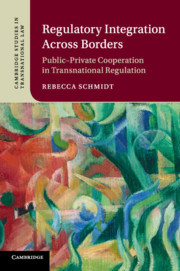Description
Regulatory Integration Across Borders
Public–Private Cooperation in Transnational Regulation
Cambridge Studies in Transnational Law Series
Author: Schmidt Rebecca
Offers an analysis of cooperation between international organizations and private actors in creating transnational regulation.
Language: English
Subject for Regulatory Integration Across Borders:
Approximative price 32.87 €
In Print (Delivery period: 14 days).
Add to cart
Regulatory Integration Across Borders
Publication date: 02-2020
Support: Print on demand
Publication date: 02-2020
Support: Print on demand
Approximative price 91.54 €
In Print (Delivery period: 14 days).
Add to cart
Regulatory Integration Across Borders
Publication date: 12-2018
258 p. · 15.6x23.5 cm · Hardback
Publication date: 12-2018
258 p. · 15.6x23.5 cm · Hardback
Description
/li>Contents
/li>Biography
/li>
This book deals with a key feature of globalization: the rise of regulation beyond the state. It examines the emergence of transnational regulatory cooperation between public and private actors and pursues an inquiry that is at once legal, empirical and theoretical. It asks why a private actor and an international organization would regulate cooperatively and what this tells us about the material meaning of concepts such as 'expertise', 'authority' and 'legitimacy' in specific domains of global governance. Additionally, the book addresses the structures and patterns in which cooperation evolves and how this affects the broader global order. It does so through an investigation of two public-private cooperative agreements: one between the International Standards Organization, the Organisation for Economic Co-operation and Development, the Global Compact and the International Labor Organization and one between the International Olympic Committee and the United Nations Environment Programme.
Acknowledgements; Cases and legislation; Organizational documents; Abbreviations; Introduction; 1. Setting the scene; 2. Regulatory interactions as a means to manage authority in a complex transnational context; 3. Integration, networks, and the global order; 4. ISO 26000 – regulatory cooperation in a fragmented field; 5. Case study on sport and the environment; 6. Reassessing cooperation; Bibliography; Index.
Rebecca Schmidt is assistant professor at Dublin City University. She obtained a Ph.D. from the European University Institute, Florence and an LLM in International and Legal Studies from New York University. Before starting her current position, she held a two-year postdoctoral fellowship at University College Dublin and a one-year postdoctoral fellowship within the Transnational Business Governance Interactions Project (at Osgoode Hall Law School and at the Baldy Center at State University of New York, Buffalo). She was also visiting fellow with the GlobalTrust Project at Tel Aviv University.
© 2024 LAVOISIER S.A.S.

